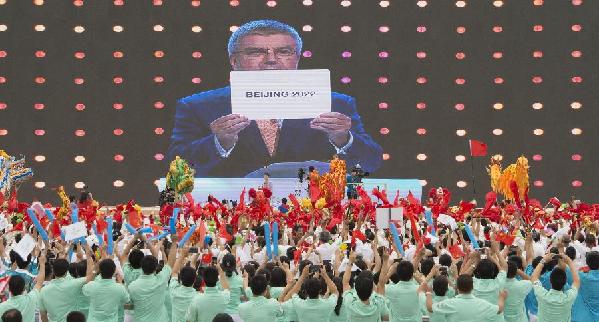Joyful Chinese celebrate Winter Olympics bid success
 0 Comment(s)
0 Comment(s) Print
Print E-mail Xinhua, August 1, 2015
E-mail Xinhua, August 1, 2015
|
|
|
People gather to celebrate at the Olympic Green in Beijing, capital of China, July 31, 2015. Beijing, together with its neighbor city Zhangjiakou, won the bid to host the 2022 Olympic Winter Games. (Xinhua/Xie Huanchi) |
Friday was another happy and memorable day for China as Beijing won the bid to host the 2022 Winter Olympic Games.
Beijing, host of the 2008 Summer Olympics, won 44 nods against rival Almaty's 40 in the International Olympic Committee vote in Kuala Lumpur Friday afternoon. It will be the first ever city to host both the summer and winter Olympics.
Celebrations
Chinese President Xi Jinping sent a letter of appreciation to IOC President Thomas Bach on Friday evening, expressing thanks to the IOC for its trust and support in selecting Beijing together with Zhangjiakou as the host of the 2022 Olympic and Paralympic Winter Games.
"To present a fantastic, extraordinary and excellent Winter Olympics is the aspiration of over 1.3 billion Chinese people. We will fulfill all our commitments and witness, together with the people of all other countries and the IOC, the advent of a new phase in the development of the Olympic winter sports and in the spread of the Olympic spirit," said Xi in the letter.
In Beijing and its co-host Zhangjiakou City, Hebei Province, people welcomed the exciting moment with traditional dances, patriotic songs and even tears.
"Beijing wins!" shouted the crowds at the Olympic Park in Beijing on Friday evening.
"It is so exciting! I am so happy!" said Li Jingfeng, a retired worker who was in tears among the joyful people in the park.
Liu Yunshan, member of the Standing Committee of the Political Bureau of the Chinese Communist Party Central Committee, attended the celebration in the park.
"The 1.3 billion Chinese people embrace the 'Olympic movement' again. This not only helps develop winter sports in China, but also strengthens the friendship and mutual understanding between the Chinese people and people from other countries and regions," said Liu.
"July 31, 2015 is a great moment to be written into the history of Zhangjiakou," said Ma Yujun, deputy secretary of the Zhangjiakou Municipal Committee of the CPC.
The official said the co-host city had overcome various difficulties, with unprecedented standards and efforts as well as enthusiasm in bracing for the moment.
Expectations
"Great changes have taken place in Beijing. The city has become more beautiful and people enjoy a richer spiritual life," said Li Xin, who works at a state-owned firm in Beijing.
"I believe the Winter Olympics will make more people love and engage in sports activities," she said.
When Han Xiaopeng, 33, became the first Chinese male athlete to ever win a gold medal at the Winter Olympics, snow events were still a bit new to Chinese audiences.
"Very few people knew about snow events at that time, not to mention the participants," Han said. "These days, more people in China are enjoying the fun brought by winter sports."
The freestyle skier was crowned in the men's aerials event in Turin in 2006. It was also the county's first Olympic title in snow events.
With Beijing's successful bid in the 2022 Winter Olympics, Han believes that winter sports will experience a boost in China.
"In the next seven years, more ski facilities will be built in our country with convenient transportation and environmental protection efforts," said Zhang Shaobo, head of the Eastgear skiing club in Beijing.
The event will push the development of Zhangjiakou, a poor area in Hebei, with the boom in skiing and related support industries.
Liu Chunzhi, from a town affiliated with Chongli, Zhangjiakou, which will host some of the skiing events, has converted her courtyard into a restaurant and guesthouse for tourists to escape the heat in summer and to enjoy skiing in winter.
"I make 100,000 yuan each year and my son, who works as a ski instructor, earns 40,000. The Olympics will bring more business to us," Liu predicted.
Preparation
Beijing 2022 will take advantage of the tremendous Beijing 2008 Olympic and Paralympic Games legacy - including existing competition venues, infrastructure and professional experience - and a clear vision for the 2022 event's integration with existing regional development plans.
Beijing has vowed to cut PM2.5, airborne particles measuring less than 2.5 microns, by 20 percent by 2017, and by 45 percent in 2022. Total environmental protection spending will total 130 billion U.S. dollars.
Joint pollution control efforts have already brought more blue sky days to the capital.
In the first half of this year, the PM2.5 density in Beijing and its neighboring areas were down by around 15 percent, official data showed.
A high-speed railway under construction linking Beijing and Zhangjiakou will cut the travel time from the capital to Chongli to around 50 minutes after completion in 2019.
The successful bid will be a boost to the national integrated development strategy for the Beijing, Tianjin and Hebei region, which aims to deal with Beijing's "urban ills" such as overcrowding and traffic congestion and help Hebei reduce its development gap with Beijing and Tianjin.
With the 2008 Olympics, China showed the world the great achievements of 30 years of reform and opening up. Seven years later, China has even more confidence and has made more progress, said Chen Liji, a senior sports official in Guangxi Zhuang Autonomous Region.







Go to Forum >>0 Comment(s)